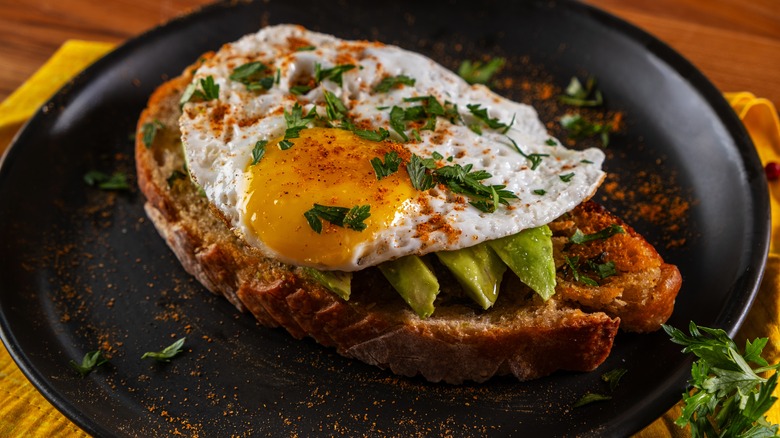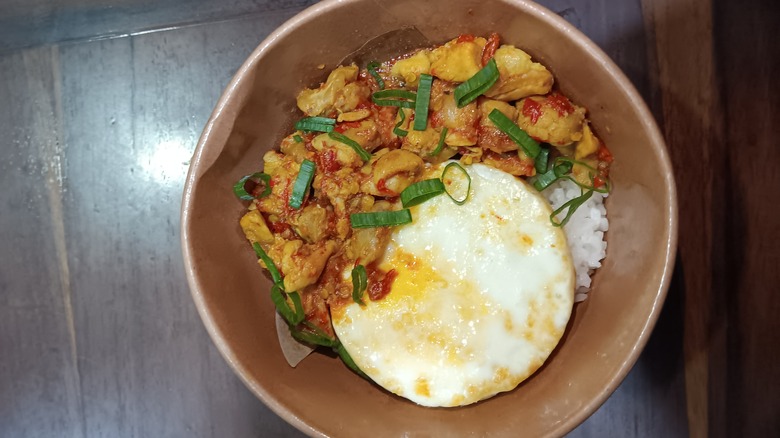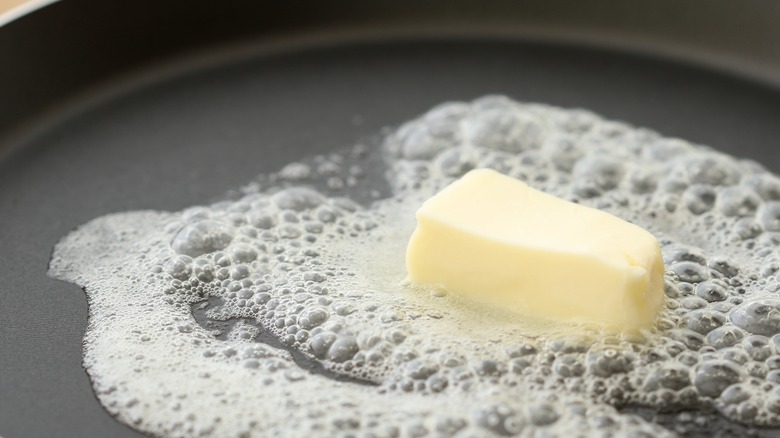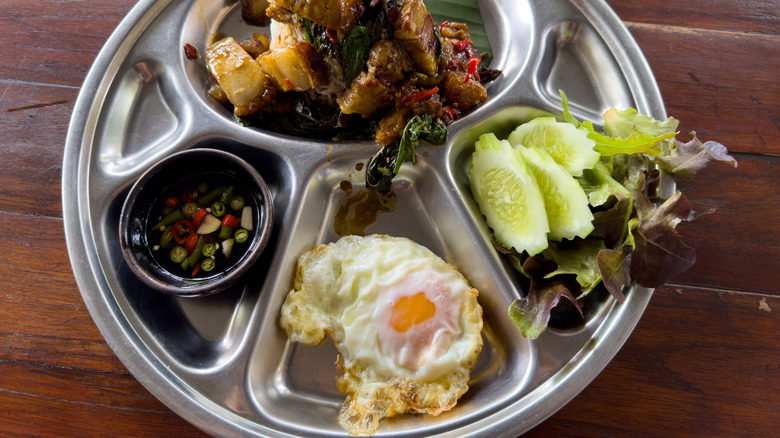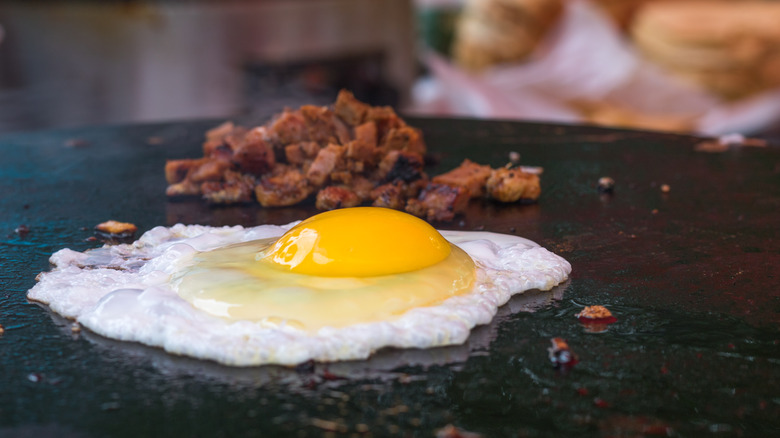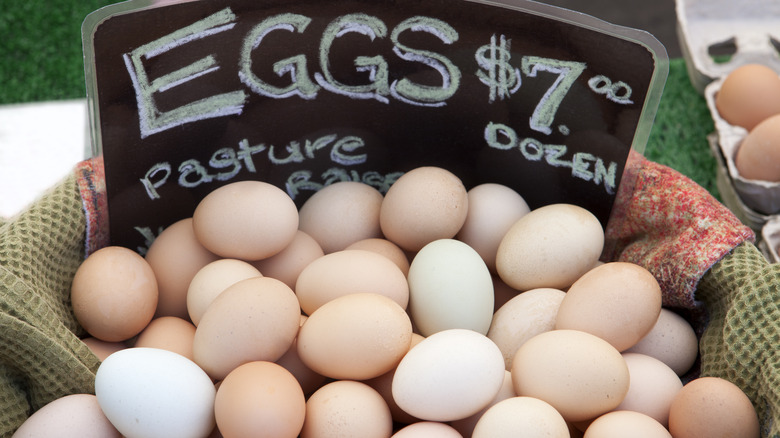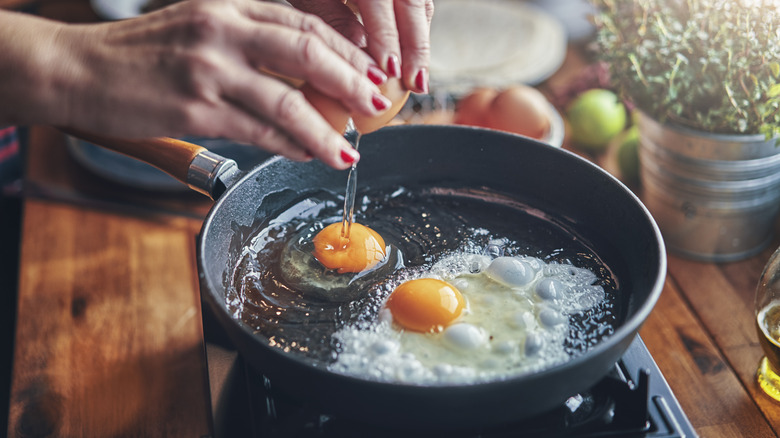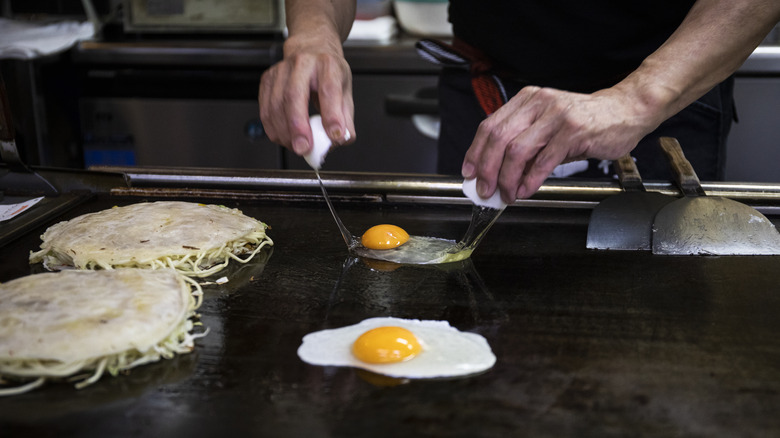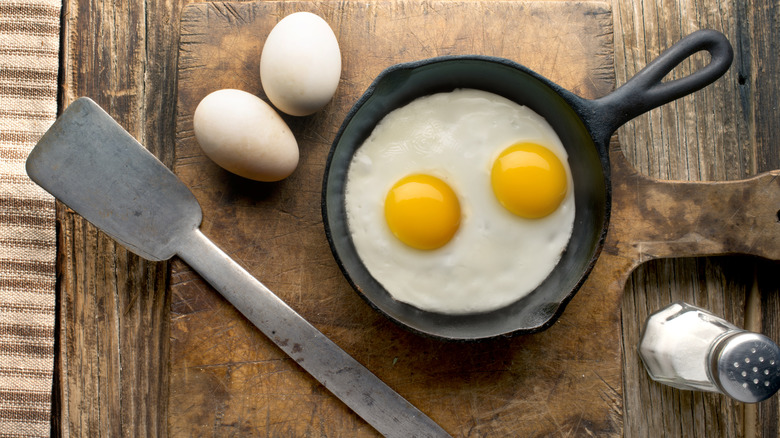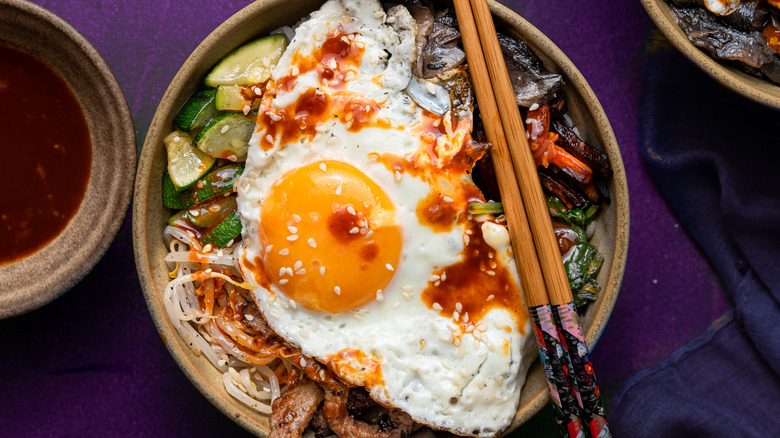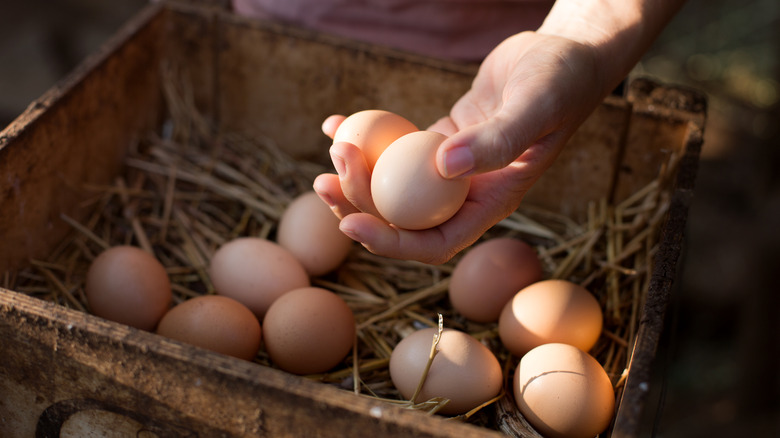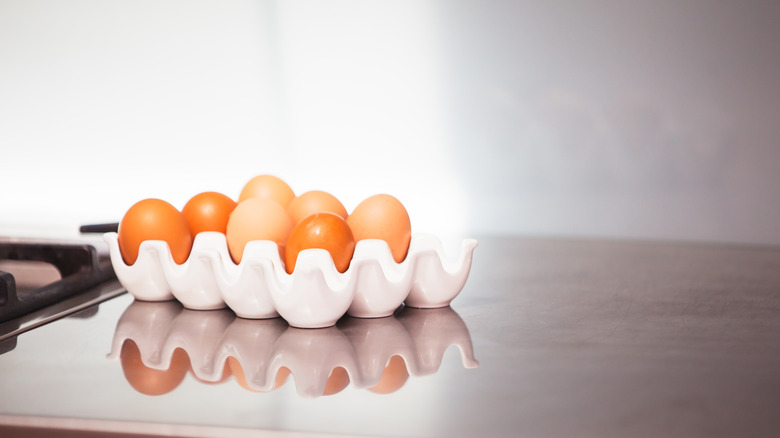11 Ways Chefs Always Get The Perfect Fried Egg
Whether tucked in a breakfast sandwich or layered on fried rice, you might have noticed fried eggs taste better at restaurants. No matter how much you practice or try, you just can't get them the same as your favorite restaurant versions. This might leave you wondering what the chef's secrets are and why you can't achieve the same results yourself at home.
Well, maybe you'll be pleased to know that we've done the legwork for you, interviewing four chefs and restaurant owners about their fried egg secrets. We've delved into the intricacies of making fried eggs, uncovering tips and tricks directly from chefs.
Some of these can't be helped. For instance, chefs have special equipment and piles of experience. However, there are some tips that you can take on to improve your fried egg game, such as using butter for flavor or oil to get crispy results. Next time you're craving a perfect fried egg, you could go out to your favorite restaurant, diner, or breakfast spot. Or, you could call on our experts' knowledge and make the best fried egg of your life.
1. Chefs know how to make various styles of fried egg
Many people learn one way of cooking fried eggs and stick to it. Chefs, on the other hand, know various ways to cook fried eggs. This is part of why fried eggs are always better from a restaurant. Expanding your repertoire and learning about various fried egg styles can help you level-up.
For instance, you might not know the difference between eggs over easy and sunny-side up but chefs sure do. For the record, both have runny yolks but sunny-side up fried eggs haven't been flipped, whereas over easy eggs have been fried on both sides — but only lightly on the flip side to keep the yolk soft.
It's also all about knowing when to utilize various egg cooking styles. "Fried eggs, over easy or over medium, are what I typically serve," says Gocha Hawkins, chef and owner of Gocha's Breakfast Bar. "They look great when plating, whether they're a main component of the dish or one of the sides."
She uses fried eggs to add a crispy, yolky component to certain entrees, thinking carefully about where they fit. "I prefer to serve over medium eggs on top of starchier sides like hash browns and potatoes, while over easy eggs are great for topping toast (which can absorb the yolk) and proteins like salmon (where the yolk acts as a sauce)," she tells us. Chefs often let customers choose the style of fried eggs if they have a preference, but most have a go-to style.
2. Fried eggs may be cooked in butter at a restaurant
If you've noticed your fried eggs tasting less flavorful than ones you've had at a restaurant, it might be down to what you cook them in. Restaurant eggs are often fried in butter, adding to their flavor. So, changing the fat you use could make a significant difference.
According to Gocha Hawkins, butter can enrich the flavor of fried eggs, and you can use salted or unsalted depending on your preference. "If I'm using butter, I allow my pan to reach medium heat before adding a good tablespoon," Hawkins says. "Once the butter melts and begins bubbling, I then add in my cracked egg before the butter browns too much." Dana Dumas, founder and head chef of SugarJam The Southern Kitchen, is another fan, telling us "real butter is key." When using butter, one option is making basted eggs. Basted eggs are similar to sunny-side up, but butter is basted over the top to help set the whites, while also adding flavor.
But, everyone has their own preferences. So, butter won't always be the order of the day. David Barlam, chef and owner of Mass Ave Diner in Cambridge, Massachusetts prefers the flavor of olive oil. "Olive oil tastes a little cleaner, butter is more rich," he says. Some people even claim the best fried eggs are cooked in buttermilk. It's up to you to experiment and figure out what you like most.
3. Chefs use oil to get crispy fried eggs
Some people's favorite restaurant eggs have a rich, buttery flavor. But, food is subjective and your preference might be for a crispy fried egg rather than a buttery one. In this case, you might be interested to know that chefs often use oil to get crispier results.
"If I want my eggs to be on the crispier side, I opt for extra virgin olive oil or canola oil," chef Gocha Hawkins tells us. Some people worry about frying with extra-virgin olive oil, but Hawkins notes that "either oil is fine since you're cooking eggs at a lower temperature point." This is great news for people who love the fruity, peppery notes of extra-virgin olive oil.
For some, fried eggs are all about a runny yolk that oozes when cut into. But, others prefer a crispy fried egg with well-set yolks, and this is what you want oil — and a longer cooking time — for. Of course, you can also get fried eggs with crispy edges and runny yolks. Some Thai dishes specifically call for crispy fried eggs, as do particular Sri Lankan curries. So, if you normally think of fried eggs as brunch fare, this isn't necessarily the case.
4. Restaurants have equipment that home cooks don't have
Commercial kitchens have equipment that people don't have at home, and this can contribute to the higher quality of restaurant fried eggs. Sadly, there's not much you can do about this, beyond moving into an abandoned IHOP. However, it's good to know that you might not be to blame if you can't get your eggs to turn out as good as they do from your favorite breakfast spot.
Chad Coulter founder and CEO of Biscuit Belly points out that restaurant conditions are just different. "We are using equipment that is at a perfect, even temp with a lot of space to flip the egg, versus a small frying pan at home," he remarks.
Chef David Barlam also mentions equipment. "In restaurants, we usually use an industrial grade griddle or pans to cook eggs on," he explains. "These are much more effective at maintaining temperature so they cook the egg more delicately."
5. Many chefs are picky about where they source their eggs
For most people, sourcing eggs means heading to the supermarket. But, quality plays a part when it comes to fried eggs. Many chefs are picky about where they source their eggs and may opt for small farms or suppliers. This makes more of a difference to their flavor and how they turn out than many people imagine.
"If eggs are going to be 'center of the plate' the quality of egg can definitely make a difference," says Chad Coulter of Biscuit Belly. "A higher quality feed for the chickens can provide a much richer, tastier yolk," he adds. "We buy directly from the food terminal in Boston and it definitely makes a difference," says David Barlam of Mass Ave Diner, adding he prefers to go straight to the source.
Gocha Hawkins of Gocha's Breakfast Bar also attests to the importance of quality, saying her establishments source eggs from a locally owned distributor. "Egg quality can make a difference," Hawkins notes. "Higher graded eggs like AA are less likely to split their yolks than grade A or B eggs, which makes it easier to fry them and deliver a restaurant-quality presentation," she explains.
So, anyone in pursuit of perfect fried eggs should think about ingredient quality. Buy eggs from your local farmers market or other small supplier. You could also ask anyone in your neighborhood who has backyard chickens for a hookup.
6. Pan temperature is important for getting restaurant quality fried eggs
If there's one thing chefs agree on about achieving perfect fried eggs it's that pan temperature is vital. If you get the pan too hot, it can easily ruin your eggs. So, it's all about finding that perfect temperature that cooks eggs gently but still makes sure they cook through.
"I'd say the temperature of your pan really matters," chef David Barlam remarks. "If it's too hot, the eggs are so delicate it can really ruin them right away." Chef Gocha Hawkins agrees that temperate can make or break fried eggs. "It's important to not let the pan get too hot, or else your eggs are going to cook too fast," she says. "It's best to fry eggs over medium heat, gradually letting them cook to avoid a rubbery texture."
Although you might not have access to kitchen equipment specially designed to maintain an even temperature, it's still totally achievable to control temperature well at home. Just stick to a medium heat — or even medium-low if you know your stove runs hot. And, choose pans that distribute heat quickly and evenly, such as those with an aluminum core.
7. It takes a lot of practice to make great fried eggs
One area where chefs have the edge is their skill and experience. Making great fried eggs takes practice and you need to learn what works and what doesn't. And, chefs at certain restaurants might make hundreds of fried eggs a day. Most home cooks won't make that many in a year, so it's no surprise your attempts aren't as good.
"Although frying an egg may seem like a simple skill, restaurant chefs perfect their form over years of practice, often adding their personal or unique touch," Gocha Hawkins remarks. "Cooking restaurant-quality fried eggs is simply a matter of trial and error as you learn how to control the pan temperature and find your favorite seasoning combination," she adds. So, the more you make and the more you learn from your mistakes, the better you'll get.
That said, you can't necessarily expect incredible fried eggs from every chef. David Barlam proposes that it all depends on the restaurant. "I've been to some fancy restaurants with talented chefs who don't necessarily know how to cook eggs well," he says. "But diners and other breakfast shops that are cooking eggs all day, those are the best."
8. Restaurant fried eggs keep their seasoning simple yet intentional
You might think that great fried eggs are all about elaborate seasoning. Well, there are various ingredients that will take fried eggs to the next level, should you want to branch out. However, with restaurant versions, it's usually all about simple seasoning. Anything too elaborate is seen as unnecessary. So, it could be the case that you've been overthinking things and getting too fancy.
David Barlam of Mass Ave Diner keeps things simple by seasoning fried eggs with salt and pepper alone. Gocha Hawkins of Gocha's Breakfast Bar is in agreement. "Simple is best when seasoning fried eggs, especially if you've fried them in butter, oil, or drippings," she says. "I begin by seasoning with a pinch of salt, cracked black pepper, and garlic powder for a rich and savory flavor." However, she also seasons fried eggs with a dash of chili pepper flakes or cayenne pepper to add a kick.
Every restaurant has its own take on things and you may also want to experiment to see what you like at home. Perhaps you'll make something you like even better than your restaurant fave. "At Biscuit Belly, we allow guests to season at the table with salt and pepper," Chad Coulter tells us. "At home, you may want to try some Dan-Os seasoning, everything bagel seasoning (if you like the crunch), or Lawry's seasoned salt," he adds.
9. Chefs think about what to pair fried eggs with
Chefs really think about what to pair their fried eggs with. This doesn't make a difference to how tasty the egg itself is, but it might elevate the dish overall, making it seem like a real standout. So, it might be that you need to learn how to make better fried eggs, but perhaps you just need to think about what you eat with your eggs.
"At SugarJam The Southern Kitchen, eggs are served with a majority of our dishes like the French toast and fried chicken, breakfast croissant sandwiches, Creole shrimp n' grits, brisket n' biscuits, just to name a few," Dana Dumas tells us. One of Gocha Hawkins' favorite ways to serve fried eggs is on top of hash browns or roasted potatoes, with cheese, spinach, quinoa, and sausage, or bacon. She also likes topping avocado toast with a fried egg.
You might also want to think about the balance of ingredients in a dish. "Typically in a breakfast combo that comes with other items, we try to portion it so the person feels like they had a filling breakfast but they aren't stuffed," remarks David Barlam. "Too many potatoes or eggs is never good, so we try to have a little of everything."
10. You need fresh eggs to get restaurant-quality results
You might think that an egg is an egg and as long as it's not totally past its best, then it will be perfectly good fried. However, this isn't the case. The freshness of your eggs can directly impact how they cook. Good chefs make sure to use fresh eggs.
"Freshness matters too, because the older an egg is, the more likely the whites are to get runny," says Gocha Hawkins. So, if you've noticed runny whites as an issue or had problems with whites not setting, it could be because the eggs just weren't fresh enough. Hawkins particularly recommends farm fresh eggs. "Eggs from farms or pastures can have brighter, richer, better quality yolks as well because of the hens' better diets," she explains.
But, how do you make sure your eggs are fresh? If you're buying them from the store, take a look at the sell-by date. Eggs are good to use for about three to five weeks after you get them home, even if the sell-by or expiry date has passed. However, they won't be as fresh as those where the sell-by date hasn't passed. So, look for a date that's at least a few weeks in the future.
That said, the better way to make sure you get fresh eggs is to buy them straight from the producer. Head to the farmers market and talk to sellers or find a local farm that sells direct to consumer. These eggs may have only been laid within the last couple of days and will be far fresher.
11. Chefs make sure to use room temperature eggs
One of the big mistakes that people make when frying eggs is not using room temperature eggs. Many home cooks keep their eggs in the fridge and take them out just before they want to fry them. However, if you want the best fried eggs, you need to use room temperature ingredients. Take your eggs out of the fridge in advance and let them come to temperature. This might seem like an annoying, unnecessary step, but it actually does make a difference.
"Be sure to use fresh eggs and let them reach room temperature before cooking," chef Gocha Hawkins advises. "This helps keep the egg whites and yolks from running, and creates less of a temperature shock when they hit a hot pan." So, if you've found that your eggs tend to run, it might simply be down to the temperature of the eggs.
You might be wondering if the simple solution to this is simply to store your eggs outside of the fridge. You might have seen that this is common in other countries and assume that it's okay. However, for those who live in the United States, the U.S. Department of Agriculture says that refrigerating eggs is the only way to store them safely because of the risk of salmonella poisoning.
